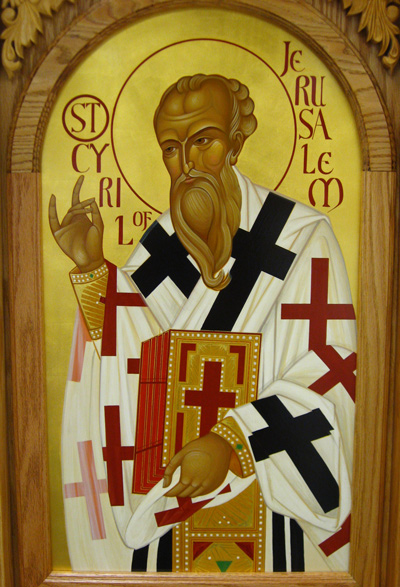My Sermon given at All Saints, St Andrews, January 31, 2016
Readings: Jeremiah 4:1-10; Psalm 71:1-6; I Corinthians 13:1-13; Luke 4:21-30
I am very happy and honoured to be here with you today on this Sexagesima Sunday, the ancient Roman way of saying the Sunday within 60 days of Easter, the season of approach to Lent. What intense readings the Church has presented to us today! And the incomparable praise of St Paul on the eternity and mysterious nature of Divine Love. And we should never forget that many aspects of God’s love for us, and indeed the love we have for each other, are quite mysterious, in a fundamental way, full of depth and nuance, and in many ways the God whom we love and adore is the God of the Unexpected. As St Paul says, we are imperfect in both knowledge and ability to foretell the future, including the actions of God, and we often have dim and childlike, and also, unfortunately, childish, expectations of what we expect God to do for us and in he world at large. We see dimly, and are often attached to the dimness of our vision, and not willing to go beyond our expectations of who God is and what God does for us, and indeed how God does it.
Thus the ancient Hebrews often expected God to give them military victories over their enemies, and sometimes He appears to; but other times He most certainly does not. In these difficult times, when their belief in God as a refuge in military affairs was sorely disappointed, in the words of the Psalmist that we heard today, they could nevertheless be called to a deeper trust in the God who comes close to us in adversity and in suffering, and in His ability to change the worst circumstances into moments of grace and spiritual growth, shows us what Love really means.
The audience in the synagogue in Galilee who listened to Jesus were perfectly normal Galilean Jews, devout and comfortable with their scriptures, used to hearing the prophecies, and able to marvel at the beautiful reading Jesus clearly gave them. And there was nothing wrong with that! I must admit I see myself in them and their sensibilities! But then as you heard something very unexpected happened, and when the remote and dimly understood prophecy was given a sudden immediacy and clarity, and they themselves were faced with criticism, the response was angry, confused and quite frankly, childish. Unexpected words can also be unsettling, especially when they come from God, and come during a religious service where we were expecting comfort and predictability. And their response is unfortunately a foreshadowing of what was to come.
And it is not only in the Scriptures that God does the unexpected; for He has continued to do so.
In our world still torn by religious division, perhaps it is ironic and instructive to remember that the greatest synthesis of Greek patristic thought was produced by a Christian scholar living under the rule of a Muslim caliph. John of Damascus in Syria (c.675-c.749) came from a prominent Christian family, but left a government post to become a monk and priest at the monastery of St. Sabas near Jerusalem. John produced a number of important works which would exert a great influence over the centuries throughout the church. His writings were marked by a clear and concise presentation, and on occasion demonstrate a real beauty of expression. At the time when John wrote, the Byzantine church was bitterly divided by the iconoclast controversy. This dispute involved a debate over whether icons, or religious images, should receive veneration and be focal points of devotion. Isn’t it amazing, and quite unexpected, that at a time when the Christian emperors were destroying icons and Christian art, a Muslim ruler protected an Orthodox theologian! John wrote several treatises defending the veneration of icons, and in doing so stressed the profound goodness of creation and all matter. The physical world, as in the case of icons, could serve to bring the human being closer to God. And when we ourselves come to this lovely church, we expect and rightly so to be consoled by the wonderful images of saints and Our Lord and Our lady that we find here. But there is more! This same emphasis on the work of the Holy Spirit in sanctifying creation plays a central role in John’s sacramental theology where he talks about the very reason we are here today, the Mystery of the Eucharist.

St. John of Damascus
The most important of John’s doctrinal works was his classic On the Orthodox Faith, and part of this treatise presents a lucid and beautiful discussion of the eucharist. The starting point for John is the affirmation of the goodness of the universe, both in its material and spiritual aspects. The purpose of all created things is to share in the Being and Goodness of God. When human beings rejected this destiny through sin, God undertook the Incarnation to once again enable us to participate in divinity, and that is what we have been celebrating in the seasons of Christmas and Epiphany and Sundays after Epiphany, the Sundays when Jesus began to reveal himself through words and signs, like the story we heard today, and on the last few Sundays. If we choose to accept this gift, we can by grace follow in Christ’s footsteps and share in his glory. And this brings us to what we do right now, right here, this very moment. To mirror this new spiritual life in Christ, we need a new spiritual food, which is the eucharist. The Last Supper was the great moment of transition, when the old Passover meal became the new covenant of the body and blood of Christ.
In a magnificent passage, John parallels the action of God during the eucharist with both the creation of the natural world and the overshadowing of Mary by the Holy Spirit at the moment of the Incarnation. As the rainfall waters and transforms the earth, echoing so many liturgical antiphons, so in the eucharistic prayer, divine power transforms and sanctifies the bread and wine, “and works these things which are beyond description and understanding.” As in baptism, God uses the most ordinary and familiar things to make us holy:
“And just as in the case of baptism, because it is the custom of men to wash themselves with water and anoint themselves with oil, He joined the grace of the Spirit to oil and water and made it a laver of regeneration, so, because it is custom to eat bread and drink water and wine, He joined His divinity to these and made them His body and blood, so that by ordinary natural things we might be raised to those which surpass the order of nature.”
The dramatic presence of God in eucharist is not merely symbolic, which we might expect; but rather to the Christian who is willing to embrace the reality, something much more unexpected, namely a moment of ecstatic unity with God and one another: As John of Damascus puts it,
“With eyes, lips and faces turned toward it, let us receive the divine burning coal, so that the fire of the coal may be added to the desire within us to consume our sins and enlighten our hearts, and so that by this communion of the divine fire we may be set afire and deified.”
With this powerful image of fire and deification, John presents us with a challenge. Eucharist is not intended to merely instruct us and help us get through life. Rather, eucharist is meant to radically transform us, to change our whole being and every aspect of how we live. Deification implies a new being, an integral membership in the Mystical Body of Christ. Such a vision mandates something quite unexpected, namely a completely new way of looking at God and our neighbor as part of ourselves, rather than as something separate and external:
“It is called participation because through it we participate in the divinity of Jesus. It is also called communion, and truly is so, because of our having communion through it with Christ and partaking both of His flesh and His divinity, and because through it we have communion with and are united to one another. For, since we partake of one bread, we all become one body of Christ and one blood and members of one another and are accounted of the same body with Christ.”
What does it mean to become deified, what does this heady language mean? What does it mean to be part of the body of Christ? Well that is a tough one, and I do not have a simple answer. A few days ago was the feast of St. Thomas Aquinas, who among many other things, was the great poet of the Eucharist, and one of his greatest hymns was Adoro Te Devote, which we shall hear at Communion. In this wonderful hymn he points toward what it means to participate in the life of Jesus Christ, the God-Man. As one verse puts it, in the lovely translation of Gerard Manley Hopkins:
O thou our reminder of Christ crucified,
Living Bread, the life of us for whom he died,
Lend this life to me then: feed and feast my mind,
There be thou the sweetness man was meant to find.
This points to the link between the Eucharist and sharing in the life of God, and on this Sexagesima sunday points us toward the season that we are on the edge of, namely Lent. For if we pay attention to the words of the liturgy, if we pay attention to the readings from Scripture, and most of all, to the words and actions of Christ as he makes his way to Jerusalem to fulfill his destiny in the dramatic events of Holy Week, we will once again begin to grasp what faith is, begin to grasp what hope is, and most of all, no matter how dimly we may see, despite all of our fears and flaws, we will see before our very eyes what Love is, and Who Love is, and a sacrificial Love that has come to bring us home to him, and transform forever our relationship with him and with one another. And this Love, indeed, has no beginning, has no limits, and will very much, as St. Paul tells us, last forever.















